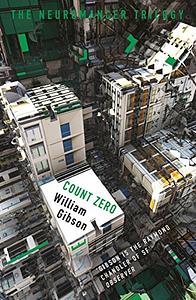You need to sign in or sign up before continuing.
Take a photo of a barcode or cover
adventurous
dark
mysterious
tense
medium-paced
Plot or Character Driven:
Plot
Strong character development:
No
Loveable characters:
Complicated
Diverse cast of characters:
Yes
Flaws of characters a main focus:
No
Con lo que me había gustado Neuromante.
A ver, esta no es una mala obra, pero me da la sensación de que muerde más de lo que puede tragar. Tiene varios personajes desde tres historias separadas que se unen al final y es un poco confuso demasiados ratos, además de que tantos personajes hacen brillar mucho más las fallas de Gibbson a la hora de desarrollarlos, creando cosas más vacias que el acostumbrado rule-of-cool pero con un punto sórdido que tanto molaba.
Tiene ideas chulas y momentos guays, además de una prosa más pulida, pero en general se hace larga y confusa y, no se, algo decepcionante.
A ver, esta no es una mala obra, pero me da la sensación de que muerde más de lo que puede tragar. Tiene varios personajes desde tres historias separadas que se unen al final y es un poco confuso demasiados ratos, además de que tantos personajes hacen brillar mucho más las fallas de Gibbson a la hora de desarrollarlos, creando cosas más vacias que el acostumbrado rule-of-cool pero con un punto sórdido que tanto molaba.
Tiene ideas chulas y momentos guays, además de una prosa más pulida, pero en general se hace larga y confusa y, no se, algo decepcionante.
"They set a slamhound on Turner's trail in New Delhi, slotted it to his pheromones and the color of his hair." So goes the first sentence in Count Zero. The lives of a gun-for-hire, an art gallery owner and a computer hacker converge as one of the world's richest men involves them in his desire for a form of immortality. Gibson's incredible imagination and great attention to detail fights with wildly divergent plot strands, and it's not until near the end that things start to really come together. Recommended for fans of Gibson's Neuromancer, but probably not the first book to reach for if you're not familiar with his work. 3.5.
Gibson’s writing is lame; he tells a story, but I don’t enjoy the words he delivers it with.
I think this was slightly worse than the first book in the series, mostly due to the tri-narrative storytelling. It was fun to see how the three vastly different storylines merged, but each ended up underdeveloped and unfulfilling. The ending sucked. Almost all of the conflict is created by magic, whether by the inhumanely rich of Gibson’s cyber-world or pseudo-Haitian vodou, and then it’s all neatly tied up with yet more magic. “This would be so much easier if we could just blow up the bad guys. Oh wait, we can.”
Gibson suffocates all of the conflict in his writing by building up to a creeping supernaturalism the reader finds hiding behind all reality, and having that be the conclusion. The knowledge of its existence, that’s it. Unless he wants to pretend his final two “happily ever after chapters” warrant any serious consideration.
And yet I read it, and I’ll read the final book in the trio as well.
I think this was slightly worse than the first book in the series, mostly due to the tri-narrative storytelling. It was fun to see how the three vastly different storylines merged, but each ended up underdeveloped and unfulfilling. The ending sucked. Almost all of the conflict is created by magic, whether by the inhumanely rich of Gibson’s cyber-world or pseudo-Haitian vodou, and then it’s all neatly tied up with yet more magic. “This would be so much easier if we could just blow up the bad guys. Oh wait, we can.”
Gibson suffocates all of the conflict in his writing by building up to a creeping supernaturalism the reader finds hiding behind all reality, and having that be the conclusion. The knowledge of its existence, that’s it. Unless he wants to pretend his final two “happily ever after chapters” warrant any serious consideration.
And yet I read it, and I’ll read the final book in the trio as well.
A little less cyberpunk than Neuromancer. Classic Gibson.
(Reread, after many years) It's interesting reading this after some of his more recent stuff. I'd forgotten the "collector" thread that seems so similar to parts of Pattern Recognition. Solid book.
A solid step below Neuromancer, with a cliffhanging structure more pulp than punk. Still a fun read, hinting at interesting concepts, but with weaker characterization and flat dialogue. Not as gritty or inventive, but faster-moving and more action-oriented.
I love the way Gibson uses language. It is beautiful. The story is now and yet... A great read.
Another brilliant piece from Gibson . . .
William Gibson's "Neuromancer" introduced us to the rather dystopian world of his cyberpunk genre; "Count Zero' expands the world a bit. It tends to get a bit metaphysical, even more than "Neuromancer," and expands the theme of the "otherworld" of cyberspace being like the spirit world of mythology and religion ("Neuromancer' treats the theme of AIs - artificial intelligences - as being like demons from folklore who can be summoned and bargained with, responding to identification codes like True Names. "Count Zero" expands the comparison to the "loa" of Voudon). Definitely worth reading . . .
William Gibson's "Neuromancer" introduced us to the rather dystopian world of his cyberpunk genre; "Count Zero' expands the world a bit. It tends to get a bit metaphysical, even more than "Neuromancer," and expands the theme of the "otherworld" of cyberspace being like the spirit world of mythology and religion ("Neuromancer' treats the theme of AIs - artificial intelligences - as being like demons from folklore who can be summoned and bargained with, responding to identification codes like True Names. "Count Zero" expands the comparison to the "loa" of Voudon). Definitely worth reading . . .
Gibson continues to build his fascinating near-future world from Neuromancer. I'll let you discover the rest!




